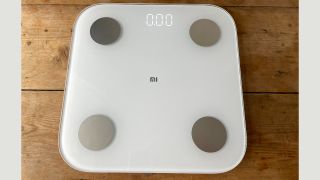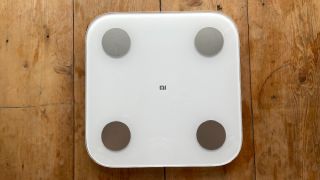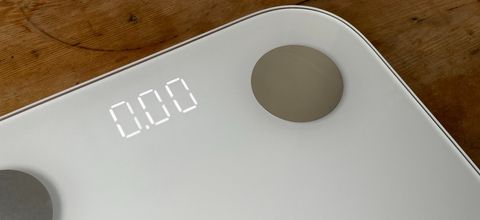Our Verdict
A useful addition for existing Xiaomi users, this budget smart scale has a useful app, though it is let down by problems with the weigh-in process.
For
- Easy integration for Xiaomi users
- Body score offers useful overview
- Offers effective advice
Against
- Full weigh-in takes longer than other smart scales
- Issues zeroing scale
- Bluetooth connection requires app to be open
You can trust Coach
An upgrade from your basic bathroom scale, the best smart scales use tiny electrical currents to estimate body composition data, such as body fat percentage and muscle mass. The readings taken by home smart scales are not 100% accurate but as long as they’re consistent, it can be a useful way to keep track of changes over time.
While top-of-the-range smart scales cost around $150/£130, at the budget end of the market there are many options that attempt to do the same job but cheaper. We tested one of these more affordable products, the Xiaomi Mi Body Composition Scale 2, and compared it with the similarly priced Renpho Smart Body Fat Scale ($27.99 in the US and £29.99 in the UK) and the higher-end Garmin Index S2 Smart Scale ($149.99/£129.99). Chinese tech brand Xiaomi is best known for making cut-price smartphones and smartwatches that give Apple a run for its money and fitness trackers to rival the best Fitbits.
Xiaomi Mi Body Composition Scale 2: Price And Availability
The Xiaomi Mi Body Composition Scale 2 has an RRP of $39.99/£29.99, and is available from Amazon and other third party retailers, usually at a discount.
The Set Up
The scale’s surface is a nice-looking minimalist square glass plate with four metal sensors, with no visible screen. It’s pleasingly curved at the corners and the plastic underside has a curved shape. It’s considerably larger and heavier than the Renpho scale, but looks classier. The scale takes four AAA batteries, which you’ll have to supply yourself – It’s not rechargeable and connects using Bluetooth rather than Wi-Fi, so you’ll need the app open to register a weigh-in. In theory, you can weigh yourself and it will appear on the app when you next open it but that didn’t always work for me.
The Experience

Step on the scale and your weight appears, displayed on the previously hidden digital screen. The numbers are white against the off-white background, a subtle combination but one that is easy enough to read – I prefer the look of this one to the bright red digital display of the Renpho scale. Only weight is displayed on the scale itself; for the rest of your stats you’ll need to look at the app. You also need to wait a short while for the six bars to light up under the weight display, showing that the scale has finished taking its readings. More than once I stepped off before it had finished and had to start again.
The scale had an irritating habit of refusing to zero itself to begin with – almost every time I used it – instead recording my weight plus 1.60kg, which is just enough extra to pass unnoticed and blame some overindulgence. I’d have to step off and give it a few nudges before it showed 00.00 and I could start again. Going by some of the customer reviews on Amazon, I’m not the only one to encounter this problem.
Using The App
The Xiaomi app, Zepp Life (formerly Mi Fit), is designed to support Mi tracker bands and watches. I don’t have one, so at first the main home page is lacking in data: steps, sleep, heart rate and activity are all blank. However, you can remove most of these if you just have the scale. Tap through to the weight and body score sections and there’s plenty of data available, displayed clearly and with context.
The app shows data for weight, body fat, muscle, protein content, water percentage, visceral fat and bone mass. Based on that data it also tells you your BMI, basal metabolic rate, body age, ideal weight and body type and gives you a “Body Score”. Tapping “History” at the bottom shows a chart of your weight and body fat changes over time, but no historical info for the other metrics.
Each of the metrics given shows a goal (chosen by the app for you based on your vital statistics) and any goals not met are listed first, with advice on how to achieve them. For example, to get in the ideal range for muscle I’m advised to do more strength training and less aerobic exercise. In my Protein section, the app informs me that I have a slightly lower than average protein content and that I should consume more eggs, beans and milk within a balanced diet to achieve a higher protein content.
There’s more depth and useful advice here than from other smart scale apps I’ve tried. Renpho offers context and presents data clearly but doesn’t offer advice on how to improve, while Garmin offers data without advice or any context, such as a normal range for your age bracket.
Body Score
Combining and analysing all your data, the app awards you a body score out of 100, categorising it with a label – “good”, “poor” and so on. It’s simplistic but gives an effective overview. The app also uses your stats to indicate what body type you are, choosing from labels that include “thick-set” and “lacks exercise”. This rather basic pigeonholing seems unnecessary. Xiaomi is a Chinese brand and at times it appears that the app suffers from translation problems – the text is stilted at best and rude at worst.
Balance Feature

The scale also has a feature that allows you to test your balance. From the home page in the app, choose Balance. The scale times you while you stand on one leg with your eyes closed, and when you step off (or fall off), the timer stops. It felt a little gimmicky and I’m not sure you need a scale to be involved – it’s just a glorified timer.
Is the Xiaomi Mi Body Composition Scale 2 Worth It?
At this price point, the Xiaomi Mi Body Composition Scale 2 is a no-brainer for Xiaomi users looking for a smart scale. It looks the part and the app has a lot to offer. But it does have a few drawbacks: like other smart scales at this price, it’s not rechargeable and requires batteries, and the Bluetooth connection means it can be used only with your phone to hand and the app open. However, the most off-putting aspects for me were the persistent problems zeroing the scale and the slow speed of the weigh-in process.

Camilla Artault is a writer and keen runner. She has covered women’s running gear – testing leggings, jackets, running bras, tops and shorts – for Coach since 2018, as well as interviewing experts and writing about a range of health and lifestyle topics.

How To Watch The London Marathon 2024 On TV Or A Live Stream

“The PBs Have Always Been Secondary, I Just Enjoyed Running”—How Anya Culling Took Two Hours Off Her First London Marathon Time

This Expert PT Recommends Kettlebell Training For Strength, Power And Cardio Gains—And These Are The Six Exercises To Master First
